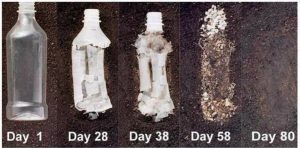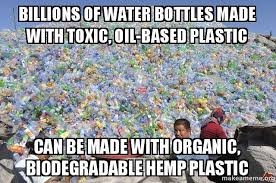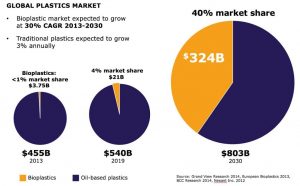
Plastic bottles take centuries to decay. Hemp takes just months.
Consumers are fighting back as they become increasingly aware. They are resisting impulse buys and often pay more just to shop at Earth friendly health friendly stores. One lost customer can result in hundreds and thousands of losses for food retailers.
Some states have stepped in and banned plastic grocery bags but such practices have hardly put a dent in the 35 Billion plastic water bottles thrown away in America alone every year. We can expect changes in the near future and fortunately we have a friend in hemp.
Hemp plastic can be completely biodegradable and takes 3-6 months to decompose. It can also be recycled indefinitely so consumers will keep using recycle bins. And unlike plastic, it is non-toxic.

35 Billion plastic bottles that won’t decay are thrown out yearly.
Because of its association with cannabis, hemp has historically been outlawed in many states but the laws are changing in its favor. In December 2018, President Trump made hemp legal to grow and cell in the United States. The government classifies hemp as any cannabis that contains less than 0.3% THC. Montana, Colorado, Oregon, Kentucky and Tennessee were the first states to aggressively grow industrial hemp once restrictions were lifted with Montana dedicating over 22,000 acres for hemp farming by February 2019.

Growing US bioplastics market projections